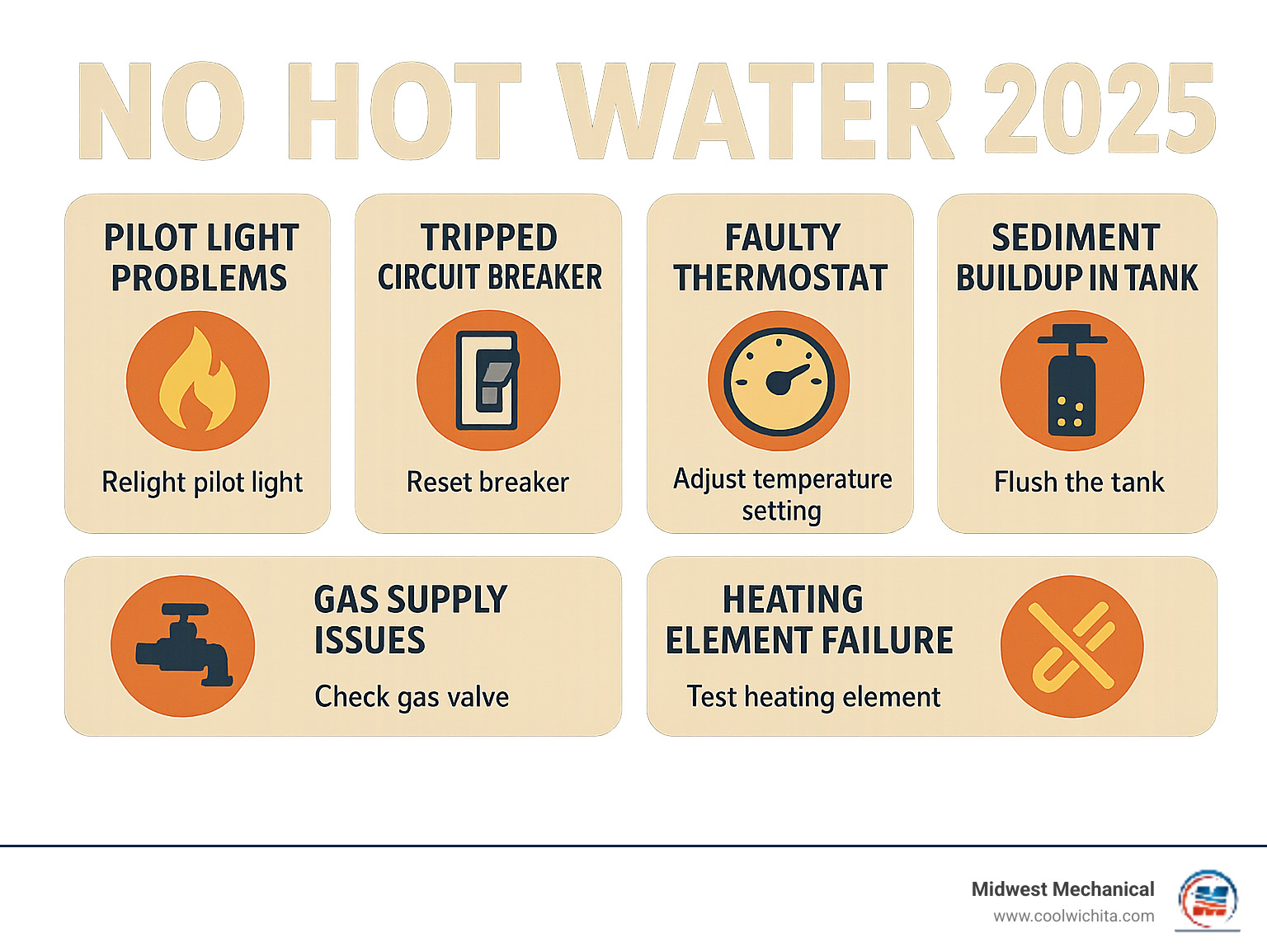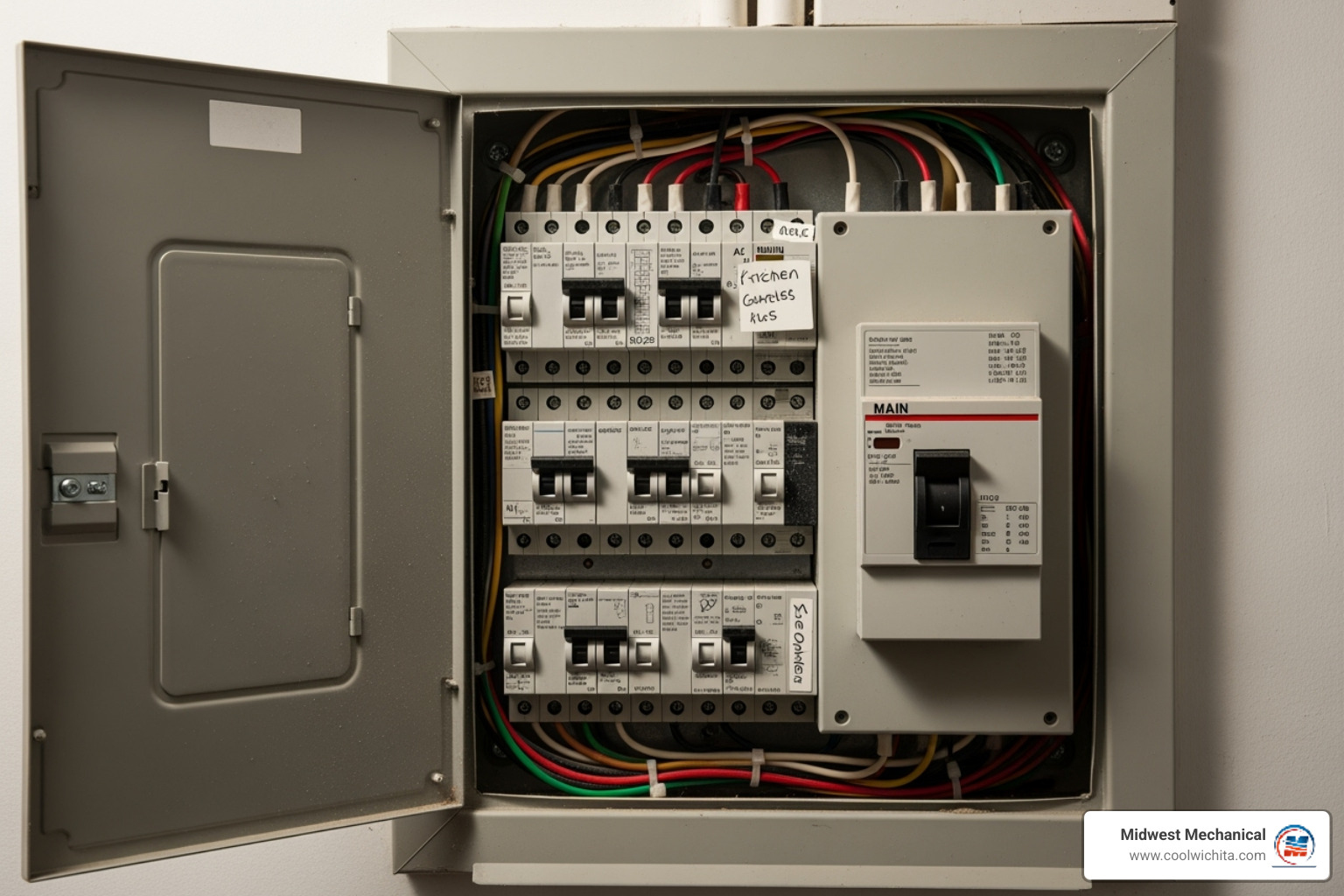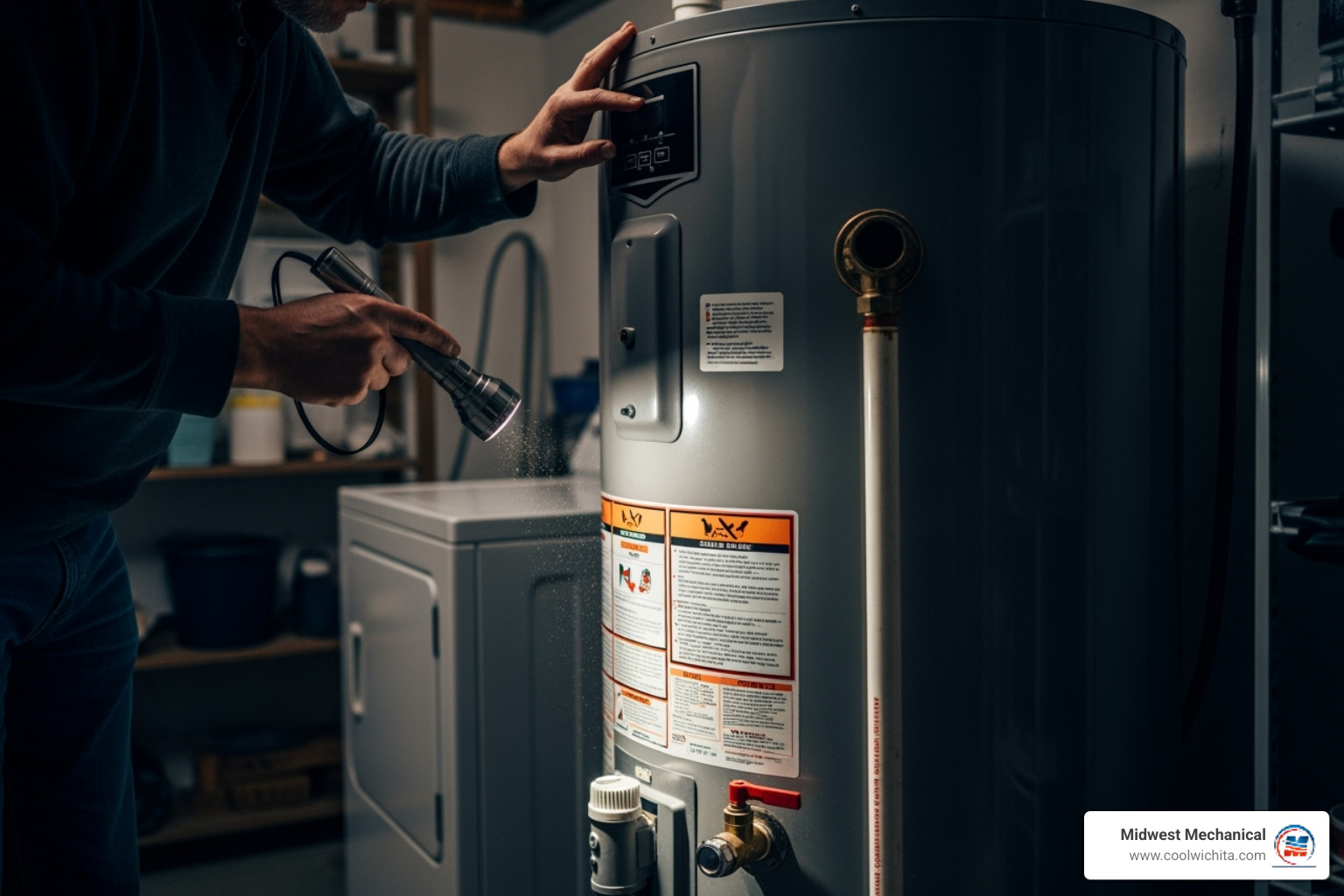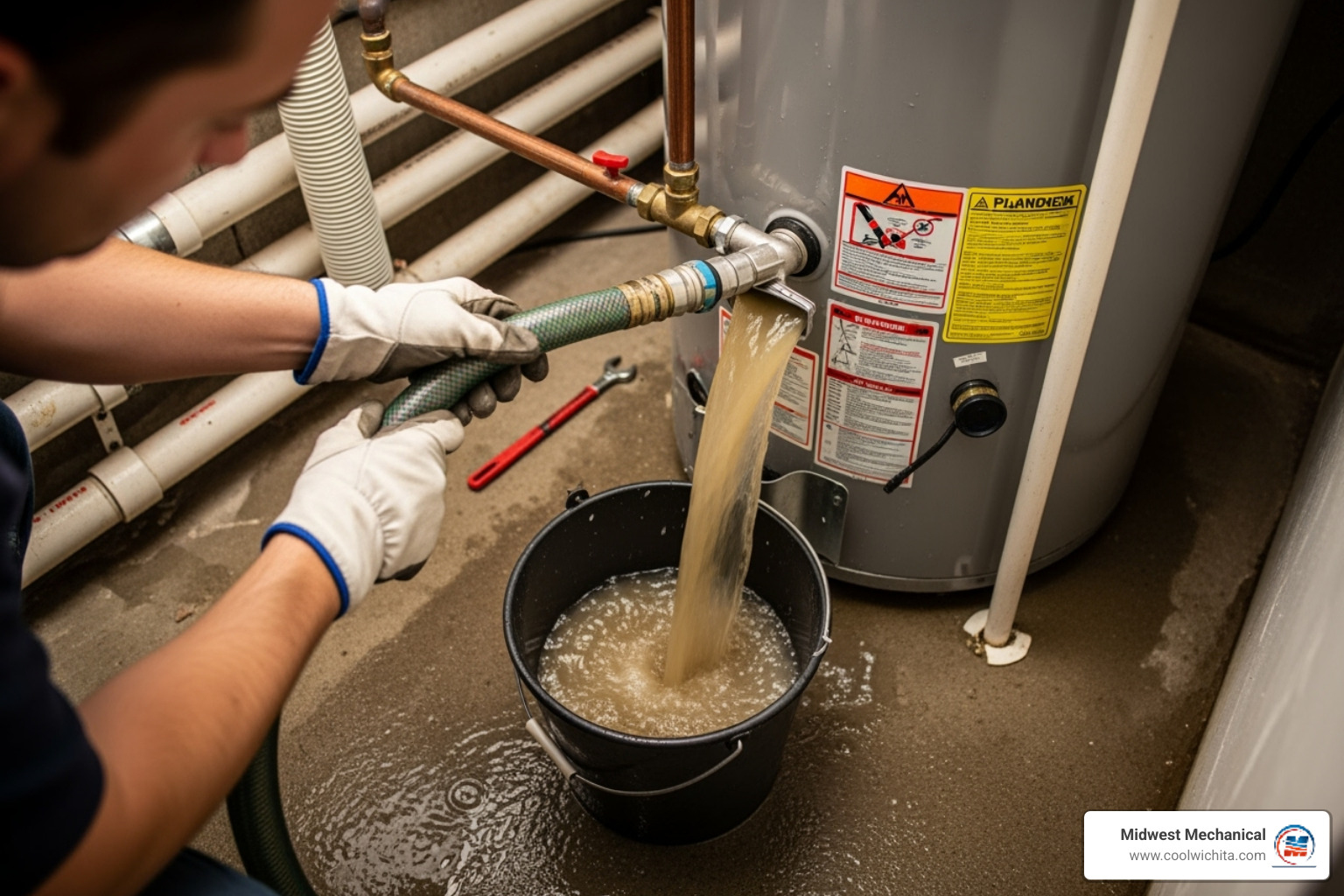Why No Hot Water Happens (And What to Do About It)
No hot water is one of the most frustrating home problems you'll face - especially when you're already running late and desperately need that morning shower. The good news? Most hot water issues have simple causes and solutions you can handle yourself.
Quick Solutions for No Hot Water:
- Check your circuit breaker - Look for tripped breakers and reset them
- Inspect the pilot light - Relight if it's gone out (gas heaters only)
- Test the reset button - Press the red reset button on electric water heaters
- Verify gas supply - Make sure gas valves are open and you smell no gas leaks
- Check thermostat settings - Ensure it's set between 120-140°F
- Look for leaks - Water around the heater means you need professional help
If you smell gas (like rotten eggs), evacuate immediately and call your utility company. Never ignore gas odors.
The most common culprits behind no hot water are surprisingly simple: a tripped circuit breaker, an extinguished pilot light, or sediment buildup blocking your heating elements. Water heaters typically last about 10 years, so age might also be a factor.
Before you panic about expensive repairs, let's walk through a systematic troubleshooting process that can save you time, money, and cold showers.

Safety First: Immediate Checks Before You Troubleshoot
When you're dealing with no hot water, your first instinct might be to dive right into troubleshooting. But hold on - let's talk safety first. Water heaters involve either gas or high-voltage electricity, and both can be dangerous if you're not careful.
Think of it this way: a few extra minutes spent on safety checks could save you from a much bigger problem down the road. Nobody wants to turn a simple water heater issue into an emergency situation.
Gas leaks are serious business. If you smell that distinctive rotten egg odor anywhere near your water heater or throughout your home, this isn't the time to play detective. That smell means natural gas is escaping, creating a fire and explosion hazard that requires immediate action.
For electric water heaters, the main safety concern is electricity. These units draw significant power, and electrical issues can cause breakers to trip or safety switches to activate. Understanding your home's electrical system will help you troubleshoot safely and effectively.
Before you start any troubleshooting, take a moment to locate your main gas shut-off valve and electrical breaker box. Knowing where these are and how they work is essential for any homeowner. If you suspect a gas leak, What to do if you suspect a leak provides detailed emergency steps. You should also know how to Detect Water Heater Valve Failures, as these can create safety hazards.
Checking Your Electric Water Heater's Power
Electric water heaters are power-hungry appliances, and sometimes they trip their circuit breakers as a safety measure. If you're experiencing no hot water from an electric unit, checking the power supply is your logical first step.

Head to your circuit breaker panel and look for the breaker labeled "water heater." Sometimes it's not clearly labeled, so look for any breaker that's in the "off" position or sitting halfway between "on" and "off" - that's a tripped breaker. To reset it, flip it firmly to "off" first, then back to "on." You should hear a solid click when it engages properly.
Many electric water heaters also have a reset button - usually red and located near the thermostat on the unit itself. This is actually a high-temperature cutoff switch that trips when the water gets dangerously hot. If your breaker looks fine, try pressing this reset button. You might hear a click when it resets.
Here's something important: if that reset button keeps tripping repeatedly, don't keep pressing it. This usually signals a deeper problem like a faulty heating element or thermostat that needs professional attention. The safety switch is doing its job by protecting you from overheating.
What to Do If You Smell Gas
Let's be crystal clear about this: if you smell gas, evacuate immediately. That rotten egg smell isn't something to investigate - it's something to escape from. Gas leaks can lead to explosions or carbon monoxide poisoning, both of which are life-threatening.
Here's your action plan: Get everyone out first, including pets. Don't worry about grabbing anything - just get out. While you're leaving, avoid using any electronics - don't flip light switches, use your cell phone inside, or turn appliances on or off. Even a tiny spark could ignite the gas.
If you can do it safely on your way out, open windows and doors to help ventilate the area. Once you're outside and at a safe distance, then use your phone to call your utility company and the fire department. Tell them you suspect a gas leak and give them your address.
Never try to find or fix a gas leak yourself. This is strictly a job for trained professionals who have the right equipment and expertise. Professional inspection is the only safe way to handle gas leaks.
Proper ventilation is crucial for gas water heaters, and if you're in the Derby area, we can help Ensure Safe Water Heater Ventilation in Derby. Good ventilation prevents dangerous gas buildup and keeps your family safe.
Diagnosing Your "No Hot Water" Problem: A Step-by-Step Guide
Now that we've covered safety, it's time to play detective and figure out why you're stuck with cold showers. Don't worry – most no hot water problems have straightforward causes that we can identify with a systematic approach.

First things first – let's identify what type of water heater you have. Gas water heaters use a burner flame to heat your water, while electric ones rely on heating elements. Tank models store heated water for when you need it, but tankless units heat water on demand as it flows through.
Knowing your system type helps us zero in on the most likely culprits. If you're noticing other warning signs beyond no hot water, it might be worth checking out our guide on Signs for Water Heater Repair.
Common Causes of No Hot Water in Gas Heaters
Gas water heaters have their own unique personality quirks. Here's what we typically find when troubleshooting no hot water in gas units:
The pilot light is usually our first suspect. Many older gas water heaters depend on this small, constant flame to ignite the main burner. If it goes out (which can happen from drafts, dirt, or just age), your burner won't fire up. You'll find instructions for relighting it right on your water heater's label, but if you're not comfortable doing it yourself, that's perfectly okay – we're here to help. Check out How to relight a pilot light for detailed steps, and we have more insights on Water Heater Pilot Light Problems.
Sometimes the pilot light looks fine, but you still have no hot water. That's when we look at the thermocouple. This safety device acts like a watchdog, sensing whether the pilot light is actually lit. When it fails, it shuts off the gas supply as a safety precaution, even if everything else seems normal.
Don't forget to check your gas supply. It sounds obvious, but we've seen cases where someone accidentally bumped the gas valve or there's a supply interruption in the area. Make sure your water heater's gas valve is fully open, and test other gas appliances like your stove to confirm gas is flowing to your home.
Troubleshooting No Hot Water in Electric Heaters
Electric water heaters march to a different drummer. When you're dealing with no hot water from an electric unit, we're usually looking at these components:
Heating elements are the workhorses of your electric water heater. Most units have two – one at the top and one at the bottom of the tank. When one fails, you might get lukewarm water. When both fail, you get cold showers. These elements can burn out over time, especially in areas with hard water.
The thermostats control when those heating elements kick on and off. Each element has its own thermostat, and when they malfunction, they might not tell the heating elements to work at all. We can help you Resolve Water Heater Thermostat Issues if this sounds like your problem.
Red reset button we mentioned in the safety section? If it keeps tripping, that's telling us something is wrong with either the thermostat or heating elements. It's designed to shut things down when the water gets dangerously hot.
And yes, double-check that circuit breaker again. Electric water heaters draw a lot of power, and breakers can trip more easily than you might expect. We also consider Energy Efficiency Ratings for Water Heaters when diagnosing issues, since failing components often impact efficiency first.
Universal Issues Affecting All Water Heaters
Some problems don't care whether you have gas or electric – they'll cause no hot water in any tank-style water heater.
Sediment buildup is probably the sneakiest culprit. Here in Kansas, our water has minerals that slowly settle at the bottom of your tank like snow in a snow globe. This sediment creates a barrier between your heating source and the water, making your system work harder and less effectively. In Derby and the greater Wichita area, this is especially common due to our water conditions. Learn more about Sediment Buildup in Derby Water Heaters.

If you see water pooling around your water heater, your tank might be leaking. A leaking tank can't maintain the water level needed for proper heating, and it poses a flooding risk to your home. Sometimes it's just a loose connection, but tank leaks often mean replacement time. We can help you Fix a Water Heater Leak Quickly to minimize damage.
The dip tube might sound like a fancy coffee gadget, but it's actually crucial for your hot water. This tube carries cold water to the bottom of your tank where it gets heated. When it breaks or corrodes, cold water mixes with the hot water at the top, giving you that disappointing lukewarm shower.
Sometimes the issue isn't that you have no hot water – it's that your water heater is simply too small for your family's needs. Growing families, teenagers who take marathon showers, or new appliances can all increase your hot water demand beyond what your current system can handle.
During our Kansas winters, frozen pipes can definitely cause no hot water problems. If your hot water supply line freezes in an unheated basement or crawl space, your water heater might be working perfectly, but the hot water just can't reach your faucets.
Repair, Replace, or Maintain? Making the Right Call
When you're dealing with no hot water for the second or third time this year, it's natural to wonder: "Should I keep fixing this thing, or is it time to bite the bullet and replace it?" We get this question a lot, and honestly, it's one of the most important decisions you'll make about your home's comfort system.
The answer isn't always straightforward, but there are some clear guidelines that can help. Water heaters typically last about 10 years - some a bit longer if they're well-maintained, others shorter if they're working overtime or dealing with hard water. Age is definitely a major factor, but it's not the only one we consider.
Think about how often you're calling for repairs. If you're on a first-name basis with your repair technician because of recurring no hot water issues, that's a pretty good sign your system is telling you something. The cost of repairs matters too - nobody wants to throw good money after bad.
Energy efficiency is another piece of the puzzle. Older units just don't perform like newer models, which means higher utility bills month after month. Sometimes what feels like an expensive replacement actually pays for itself through energy savings. For a deeper dive into when replacement makes the most sense, check out our guide on When to Replace Your Water Heater.
Simple Fixes and Proactive Maintenance
Here's the thing about water heaters - they're surprisingly low-maintenance when you give them a little attention. Think of it like changing the oil in your car. Skip it long enough, and you'll face much bigger problems down the road.
Flushing your tank annually is probably the single best thing you can do to prevent no hot water situations. All that sediment we talked about earlier? It doesn't just disappear on its own. When you flush the tank, you're essentially giving your water heater a fresh start, removing the buildup that makes it work harder and less efficiently.
Checking your anode rod every 3-5 years might sound technical, but it's actually pretty straightforward. This sacrificial rod is designed to corrode instead of your tank - it's literally taking one for the team. When it's completely corroded, your tank starts deteriorating instead. Replacing a $20 anode rod beats replacing a $1,200 water heater any day.
Adjusting your thermostat to the right temperature - around 120°F (49°C) as recommended by This Old House - saves energy and prevents scalding. Too hot wastes money, too cool leaves you with lukewarm showers.
Inspecting connections annually helps you catch small leaks before they become big problems. Look for water around the base, check electrical connections on electric models, and make sure gas connections are secure on gas units.
Testing your T&P valve yearly ensures this critical safety device will work when needed. This valve prevents dangerous pressure buildup - definitely something you want functioning properly.
These simple maintenance tasks can add years to your water heater's life and prevent most of the common problems that leave you with no hot water. We've got more detailed tips on how to Extend Your Water Heater's Life in Derby.
Deciding Between Repair and Replacement
This decision often comes down to math, but it's math that makes sense once you break it down.
Age is the first factor we consider. If your water heater is pushing 10 years and starting to act up, replacement usually makes more financial sense than repairs. Think about it - even if we fix today's problem, other components are likely to fail soon.
The 50% rule is a good guideline: if the repair costs more than half the price of a new unit, replacement is typically the smarter choice. This is especially true for older units where you might face multiple repairs in quick succession.
Recurring problems are a red flag. If you're dealing with no hot water issues every few months, your system is trying to tell you it's time to retire. Constant repairs add up quickly, both in cost and frustration.
Upgrading to tankless might be worth considering if you're replacing anyway. These units can be 24-34% more energy-efficient for homes using less than 41 gallons of hot water daily, and they typically last 20+ years. The upfront cost is higher, but the energy savings and endless hot water supply make them attractive for many families. We often discuss the Benefits of Tankless Water Heaters with homeowners facing replacement decisions.
When you're ready for a new installation, we'll walk you through the entire process. Our Water Heater Installation Steps guide shows you what to expect, from start to finish.
The bottom line? We're here to help you make the decision that's right for your home, your budget, and your family's needs. Sometimes that means a simple repair, sometimes it means an upgrade - but we'll always give you honest advice about which path makes the most sense.
Frequently Asked Questions about Hot Water Issues
We get calls every day from frustrated homeowners across Wichita, KS, and surrounding areas like Mulvane, KS, and Valley Center, KS, who are dealing with hot water problems. Here are the questions we hear most often - and the answers that usually solve the mystery.
Why is my water only lukewarm, not hot?
Nothing's more disappointing than stepping into what you expect to be a hot shower, only to be met with barely warm water. This particular problem usually points to one of four specific culprits.
A faulty dip tube is often the sneaky villain here. When this tube breaks or deteriorates, cold water coming into your tank doesn't make it to the bottom where it should be heated. Instead, it mixes with the hot water at the top, instantly cooling everything down. You'll notice your hot water turns cold quickly or never gets truly hot in the first place.
Sediment buildup acts like a thick blanket between your heating source and the water. Over time, minerals settle at the bottom of your tank, creating an insulating barrier that makes your heating element or burner work much harder - often unsuccessfully. The water might eventually get warm, but it takes forever and rarely reaches a satisfying temperature.
Sometimes the fix is surprisingly simple: check your thermostat setting. The ideal temperature is around 120°F (49°C) for both safety and efficiency. If someone accidentally bumped it down or it was never set correctly, you'll be stuck with lukewarm water no matter how long you wait.
Finally, your water heater might simply be undersized for your household's needs. If you're constantly running out of hot water during peak times - like when everyone's getting ready for work or school - your tank can't keep up with demand. Electric water heaters are especially slow to recover, taking about two hours to fully reheat a 40-gallon tank.
How do I reset my water heater?
The reset process depends entirely on what type of water heater you have, but don't worry - both are pretty straightforward once you know what to look for.
For electric water heaters, start by checking your home's main electrical panel. Look for the circuit breaker that controls your water heater - it might be tripped and sitting halfway between "on" and "off." Flip it completely to "off" first, then firmly back to "on."
Most electric units also have a red reset button somewhere on the unit itself, usually near the upper thermostat. This little button trips when water gets too hot, acting as a safety feature. Press it firmly - if it clicks, that means it was tripped and hopefully your problem is solved. If it keeps tripping repeatedly after you reset it, there's a deeper issue like a faulty thermostat or heating element that needs professional attention.
Some electric water heaters don't have a visible reset button. In these cases, simply unplugging the unit for a few minutes and plugging it back in can reset the internal controls.
For gas water heaters with pilot lights, you'll need to relight the pilot if it's gone out. The exact steps vary by manufacturer, so we always recommend checking your owner's manual or the instruction label on your unit first. Generally, you'll turn the gas valve to "pilot," press a button to allow gas flow, and light the pilot flame using the built-in igniter. Hold the button for about a minute to heat the thermocouple, then turn the gas valve to "on."
Can a frozen pipe only affect my hot water?
Absolutely! This surprises many homeowners, but it's actually pretty common during our Kansas winters. You might have cold water flowing just fine while experiencing no hot water at all.
Here's how it happens: Your hot water supply line might run through an unheated crawl space, attic, or along an exterior wall where it's more exposed to freezing temperatures. Meanwhile, your cold water line could be better insulated or running through a warmer part of your home. When that specific hot water pipe freezes, you'll lose hot water completely even though cold water flows normally.
Thawing frozen pipes safely requires patience. First, locate the frozen section - it's usually in an exposed area. You can use a hairdryer, heating pad, or towels soaked in hot water to gradually warm the pipe. Keep the affected faucet open while you work so water can flow once the ice melts. Never use an open flame or torch - that's a fire hazard and can damage your pipes.
Prevention is your best strategy for avoiding future freezes, especially during cold snaps in areas like Sedgwick, KS, or Kechi, KS. Insulate any exposed pipes, allow a slow drip from faucets during freezing weather, and keep cabinet doors open under sinks to let warm air circulate around pipes. These simple steps can save you from dealing with frozen pipes and no hot water when you need it most.
Get Your Hot Water Flowing Again
Dealing with no hot water doesn't have to turn your day upside down. Throughout this guide, we've walked through the most common causes and solutions, always keeping safety as our top priority.
The key is taking a systematic approach. Start with those crucial safety checks - especially if you smell gas or suspect electrical issues. Then work through the diagnostic steps for your specific type of water heater. Many times, the culprit is something surprisingly simple like a tripped breaker or an extinguished pilot light.
Regular maintenance really makes a difference. Flushing your tank annually, checking that anode rod every few years, and keeping an eye on your thermostat settings can prevent most hot water headaches before they start. Think of it as a small investment that pays big dividends in consistent hot showers.
Of course, we know not everyone feels comfortable tackling gas lines, electrical components, or major plumbing issues - and that's perfectly okay! Some problems require professional expertise, especially when safety is involved.
When should you definitely call a pro? If you've tried the basic troubleshooting steps and still have no hot water, or if you're dealing with gas leaks, major electrical problems, or a leaking tank, it's time to bring in the experts.
At Midwest Mechanical, we've been helping families across Wichita, KS, and surrounding communities like Andover, Bel Aire, Derby, Goddard, and Park City get their hot water flowing again. We understand how disruptive no hot water can be to your daily routine, which is why we focus on quick, reliable solutions.
Our team brings both traditional service values and modern expertise to every job. Whether you need a simple repair, regular maintenance, or a complete system upgrade, we're here to restore your home's comfort safely and efficiently.
Don't let another cold shower ruin your morning. Contact us for Expert HVAC and Plumbing Services in Wichita, KS and get your hot water back where it belongs - flowing freely from every faucet in your home.
Customer Testimonials
Hear from satisfied customers who trust us for reliable HVAC and plumbing service across Wichita.






Plus, the technician, Lee was very professional, knowledgeable and informative.
We will definitely be doing business with them sometime again in the past.


I'm prompt to my appointment. Thank you Midwest Mechanical.









We have partnered with GoodLeap to offer flexible payment options for your project. GoodLeap uses a soft credit check until funding and the highest score from all 3 bureaus to see if you qualify. It also takes just a few minutes to get started.




Service Areas
.svg)



